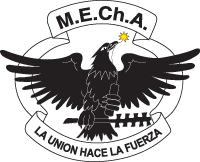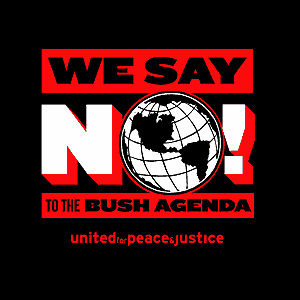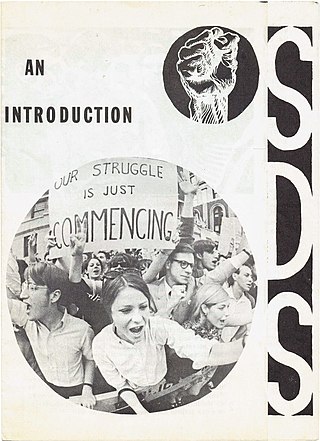
Earth Day is an annual event on April 22 to demonstrate support for environmental protection. First held on April 22, 1970, it now includes a wide range of events coordinated globally by EARTHDAY.ORG including 1 billion people in more than 193 countries.

The Student Nonviolent Coordinating Committee, and later, the Student National Coordinating Committee was the principal channel of student commitment in the United States to the civil rights movement during the 1960s. Emerging in 1960 from the student-led sit-ins at segregated lunch counters in Greensboro, North Carolina, and Nashville, Tennessee, the Committee sought to coordinate and assist direct-action challenges to the civic segregation and political exclusion of African Americans. From 1962, with the support of the Voter Education Project, SNCC committed to the registration and mobilization of black voters in the Deep South. Affiliates such as the Mississippi Freedom Democratic Party and the Lowndes County Freedom Organization in Alabama also worked to increase the pressure on federal and state government to enforce constitutional protections.

A protest is a public act of objection, disapproval or dissent against political advantage. Protests can be thought of as acts of cooperation in which numerous people cooperate by attending, and share the potential costs and risks of doing so. Protests can take many different forms, from individual statements to mass political demonstrations. Protesters may organize a protest as a way of publicly making their opinions heard in an attempt to influence public opinion or government policy, or they may undertake direct action in an attempt to enact desired changes themselves. When protests are part of a systematic and peaceful nonviolent campaign to achieve a particular objective, and involve the use of pressure as well as persuasion, they go beyond mere protest and may be better described as civil resistance or nonviolent resistance.

The 1999 Seattle WTO protests, sometimes referred to as the Battle of Seattle, were a series of anti-globalization protests surrounding the WTO Ministerial Conference of 1999, where members of the World Trade Organization (WTO) convened at the Washington State Convention and Trade Center in Seattle, Washington on November 30, 1999. The Conference was to be the launch of a new millennial round of trade negotiations.

M.E.Ch.A. is a US-based organization that seeks to promote Chicano unity and empowerment through political action.

A sit-in or sit-down is a form of direct action that involves one or more people occupying an area for a protest, often to promote political, social, or economic change. The protestors gather conspicuously in a space or building, refusing to move unless their demands are met. The often clearly visible demonstrations are intended to spread awareness among the public, or disrupt the goings-on of the protested organization. Lunch counter sit-ins were a nonviolent form of protest used to oppose segregation during the civil rights movement, and often provoked heckling and violence from those opposed to their message.

Student activism or campus activism is work by students to cause political, environmental, economic, or social change. In addition to education, student groups often play central roles in democratization and winning civil rights.

United for Peace and Justice (UFPJ) is a coalition of more than 1,300 international and U.S.-based organizations opposed to "our government's policy of permanent warfare and empire-building."
A teach-in is similar to a general educational forum on any complicated issue, usually an issue involving current political affairs. The main difference between a teach-in and a seminar is the refusal to limit the discussion to a specific time frame or a strict academic scope. Teach-ins are meant to be practical, participatory, and oriented toward action. While they include experts lecturing on their area of expertise, discussion and questions from the audience are welcome, even mid-lecture. "Teach-ins" were popularized during the U.S. government's involvement in Vietnam. The first teach-in, which was held overnight at the University of Michigan in March 1965, began with a discussion of the Vietnam War draft and ended in the early morning with a speech by philosopher Arnold Kaufman.

Opposition to United States involvement in the Vietnam War began in 1965 with demonstrations against the escalating role of the United States in the war. Over the next several years, these demonstrations grew into a social movement which was incorporated into the broader counterculture of the 1960s.

The Greensboro sit-ins were a series of nonviolent protests in February to July 1960, primarily in the Woolworth store — now the International Civil Rights Center and Museum — in Greensboro, North Carolina, which led to the F. W. Woolworth Company department store chain removing its policy of racial segregation in the Southern United States. While not the first sit-in of the civil rights movement, the Greensboro sit-ins were an instrumental action, and also the best-known sit-ins of the civil rights movement. They are considered a catalyst to the subsequent sit-in movement, in which 70,000 people participated. This sit-in was a contributing factor in the formation of the Student Nonviolent Coordinating Committee (SNCC).
Global Exchange was founded in 1988 and is an advocacy group, human rights organization, and a 501(c)(3) organization, based in San Francisco, California, United States. The group defines its mission as, "to promote human rights and social, economic, and environmental justice around the world." Global Exchange deals with a wide range of issues, ranging from the U.S. war in Iraq to worker abuse and fair trade issues.

The Young Democratic Socialists of America (YDSA) is the youth section of the Democratic Socialists of America. The organization was known as Young Democratic Socialists (YDS) until 2017.

As an act of protest, occupation is a strategy often used by social movements and other forms of collective social action in order to squat and hold public and symbolic spaces, buildings, critical infrastructure such as entrances to train stations, shopping centers, university buildings, squares, and parks. Occupation attempts to use space as an instrument in order to achieve political and economic change, and to construct counter-spaces in which protesters express their desire to participate in the production and re-imagination of urban space. Often, this is connected to the right to the city, which is the right to inhabit and be in the city as well as to redefine the city in ways that challenge the demands of capitalist accumulation. That is to make public spaces more valuable to the citizens in contrast to favoring the interests of corporate and financial capital.

Students for a Democratic Society (SDS), or New Students for a Democratic Society (New SDS) is a United States student activist organization founded in 2006 in response to the US invasions of Iraq and Afghanistan with the aim to rebuild the student movement. It takes its name and inspiration from the original SDS of 1960–1969, then the largest radical student organization in US history. While working alongside such groups as the Freedom Road Socialist Organization, the contemporary SDS is a distinct youth and student-led organization with chapters across the United States.

Power Shift Network is a North American non-profit organization made up of a network of youth-led social and environmental justice organizations working together to build the youth clean energy and climate movement. It runs campaigns in the United States and Canada to build grassroots power and advocate for tangible changes on climate change and social justice at local, state, national and international levels in North America. The organization changed its name from Energy Action Coalition in July 2016 in order to reflect its new leadership and it shift from a coalition to a network structure. The Power Shift Network's members, which include other non-profit organizations and student groups focused on environmental justice, social justice, and climate change, focus their organizing and campaigns on campuses, communities, corporate practices, and politics. The Power Shift Network is part of the Global Youth Climate Movement.

Students for a Democratic Society (SDS) was a national student activist organization in the United States during the 1960s and was one of the principal representations of the New Left. Disdaining permanent leaders, hierarchical relationships and parliamentary procedure, the founders conceived of the organization as a broad exercise in "participatory democracy". From its launch in 1960 it grew rapidly in the course of the tumultuous decade with over 300 campus chapters and 30,000 supporters recorded nationwide by its last national convention in 1969. The organization splintered at that convention amidst rivalry between factions seeking to impose national leadership and direction, and disputing "revolutionary" positions on, among other issues, the Vietnam War and Black Power.

United Students Against Sweatshops (USAS) is a student organization founded in 1998 with chapters at over 250 colleges and universities in the United States and Canada. In April 2000, USAS founded the Worker Rights Consortium (WRC), an independent monitoring organization that investigates labor conditions in factories that produce collegiate apparel all over the world. The WRC exacts an annual membership fee from participating universities, which is used to fund its monitoring work.

The anti-globalization movement, or counter-globalization movement, is a social movement critical of economic globalization. The movement is also commonly referred to as the global justice movement, alter-globalization movement, anti-globalist movement, anti-corporate globalization movement, or movement against neoliberal globalization. There are many definitions of anti-globalization.
Vietnam War protests at the University of Michigan occurred during the 1960s, when many students and professors from the University of Michigan gathered together in opposition of the Vietnam War. Together, they held a series of student protests and faculty demonstrations that challenged the U.S. government as well as the university administration. While these protests were part of a national trend, those at the University of Michigan stand out for early influence on other universities as well as their persistent nature.
















